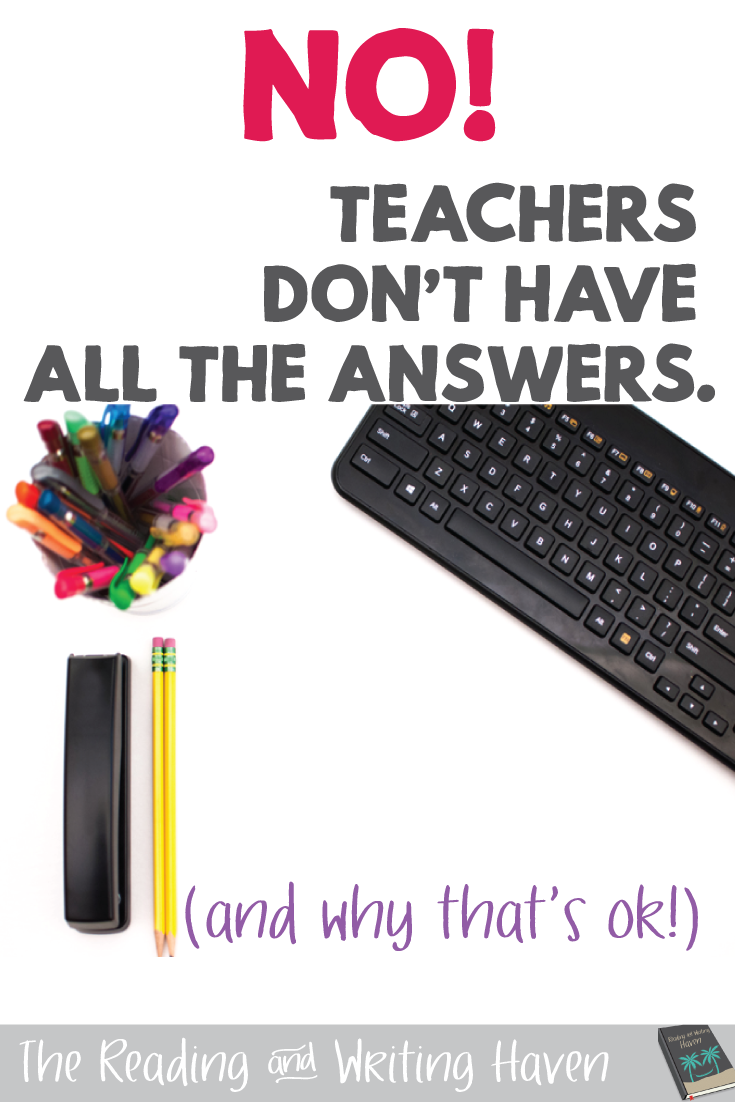How Admitting Ignorance Promotes Learning
Have you ever been in that awkward situation where a student asks you a question you should probably be able to answer, but you just don’t know? Of course you have! It happens to us all, but for many of us who feel it’s our duty to be experts in our field, it’s a little embarrassing when it happens.
When I first started in the profession, I imagined a day when I would know all the answers…when I wouldn’t have to feel the discomfort of uncertainty when a parent or student asked a question I wasn’t ready for. Except now I have been teaching for eleven years, and there are times I still feel unprepared for questions I face in the classroom. No matter how many college degrees teachers have earned (for me, it’s three), it’s just not possible to know ALL the answers ALL of the time.
Why is it that teachers feel the necessity to be omnipotent? We are merely human, and no matter how intelligent we are, it’s impossible to have all the answers. Even Google doesn’t have a response for everything, and Siri has no problem responding, “Sorry, I didn’t quite get that.” So if the biggest search engine on Earth can’t generate a definite answer for every question, why should teachers be expected to do so?
As teachers, sometimes we think people expect us to know EVERYTHING. We should be able to diagram sentences on the spot and to explain what every line of Romeo and Juliet means without reference materials. If we can’t, we get the impression people (students, parents, teachers…) feel we’re not qualified in our field. Let’s not buy into this lie.
When I first started teaching, I would spend HOURS reading and re-reading literature, anticipating possible questions just to try to avoid any awkward moments where I didn’t have an answer. As the years pass and students still stump me on a daily basis, I’m beginning to relax. We all should. We need to get comfortable with not knowing.
I mean, our content area, standards, worldly issues…they’re always changing. Occasional ignorance is a reality in the world of education. But that’s not a bad thing! Not knowing the answer can actually facilitate learning if handled the right way. By being honest, students learn they can trust us, and admitting our ignorance also opens up opportunities for student participation.
What can we do to try to change this mentality that if teachers don’t have all the answers, they are not worthy of our respect? How can we reframe the situation so that all parties see the learning opportunities available? Here are some strategies I have found successful for me.
Tell students up front that you are not a human encyclopedia.
Be honest. I start my year by making sure my students and their parents know I’m not claiming to be all-knowing about my content area. I assure them that I am still learning and that I hope we have many opportunities to grow together throughout the school year. Students value that truthfulness more than if I were to make something up off the top of my head. Kids are smart. They can read through fear and lies.
Encourage students to pose questions that are so thoughtful they stump you.
I try to reward my students by showering them with praise every time they ask a question I cannot answer. Putting them in the driver’s seat by encouraging them to look up the answer and come to class the next day to share what they found with everyone is similarly effective. It also gives the students a sense of ownership in the classroom, and it raises the level of critical thinking that is happening.
Research together.
Many times, when I don’t have an answer to a student question and it’s one I think we can find quickly, I’ll do research on the spot. Seize the teachable moment. Then I’ll thank the student for the opportunity they provided everyone to learn together. Plus, it gives me a chance to show students how to find credible sources to answer our questions. I use this time to demonstrate the difference between clicking on the first link on Google and sifting through the biased junk to find the most credible gems. If your school has one-to-one capabilities, or if you’re in a computer lab, use those devices to have students research the answer and share their findings with the class.
Assign web quests.
I love web quests. They provide opportunities for students to look up self-generated questions before even posing them to the class, and then they can share what they learned with their peers and their teachers. I craft mine so that they have a list of questions all students should answer, but they also have a portion where students create their own questions based on their interests in the topic.
Make your students the experts.
My students are frequently uncomfortable at the beginning of the year when I use jigsaws and other group activities that put them in charge. They are not used to having to be an expert on a topic. They like to sit back and ask their teacher questions. However, that’s not student-centered learning. I enjoy handing them the reins, especially when we are covering new material that I’m not yet well-versed in. Allowing them to do the research and teach their peers is a valuable experience that will prove more fruitful for everyone involved than simply listening to a lecture.
Tell them you’ll get back to them tomorrow.
If we are reading a complex text (like Shakespeare) or studying grammar, students will frequently ask me questions that I can’t answer in that moment. Even though I love grammar, for instance, it sometimes takes me a little while to analyze a sentence before I can respond to a question about verb tenses or gerund functions. If I need time to digest the material, I just say, “Wow, that’s a good question. I honestly can’t answer that right now, but I’ll be happy to think about it some more and get back to you tomorrow.” No harm done, and students have responded well to this exchange in the past. Responding quickly with an answer you’re not sure is correct will just lead to doubt and distraction as you continue to replay the conversation in your head.
Utilize guest speakers.
There are some topics I have to cover in my classroom that I just don’t enjoy. And I can’t fake it. But I don’t want to slight students or jip them out of a valuable learning experience. So why not invite a guest speaker? Many authors, writers, business people, firemen, and other professionals are more than willing to come into schools and speak to students. I frequently use librarians as guest speakers also. The librarian at our school does an excellent job teaching students about databases, source credibility, and banned books, among other topics. Students love guest speakers!
Use videos.
Videos are awesome…in moderation. If I have a topic that is complex, that has generated a lot of questions, or that I can’t find a guest speaker for, videos can be an excellent resource once the initial topic foundation has been laid. I always provide questions for analysis and comprehension, and I try to pause the video frequently to discuss the content with students rather than letting them sit there like zombies for 45 minutes straight. Don’t get me wrong…students HATE it when I pause the video. But, I use the opportunity to remind them that we are watching the video to learn about the content, and part of learning is discussing the material with others.
Join a support group.
Maybe you think I’m joking, but I’m not. If you look hard enough, there are professional groups out there for every subject area where teachers can pose questions in a forum where people won’t judge them for not knowing everything. For example, I just joined Grammar Gurus, a Facebook group where English teachers can ask grammar questions without being judged or ridiculed for their ignorance. Sometimes just having fellow professionals with similar issues and insecurities is enough to boost our confidence.
Prepare thoroughly.
As I think about admitting ignorance, I think it’s important to stress that as teachers, we are professionals, and many students depend on us on a daily basis. We have to do our jobs to the best of our abilities, which means that if we are lesson planning, we truly do need to prepare. Part of that includes anticipating student questions and misconceptions. If you’re teaching a new novel or new concept, don’t “wing it.” You’ll feel much more comfortable admitting you don’t know the answer to a question if you’ve done the leg work to study the material to the best of your ability. If you’re using a co-worker’s PowerPoint, read through it before hand, and make a list of talking points. Make sure you understand the material you are imparting to students. If you’ve studied and feel good about your preparation, there’s no harm in not having answers for questions that stump you.
Respect students’ desire to learn.
Above all else, remember what it was like to sit in a classroom as a student. Keep in mind that students are there to learn, and they will have more respect for you as a teacher if you keep their best interests in mind. Don’t panic. Don’t stress. And don’t make stuff up. They will thank you for your integrity later.
Teachers need to remember that it’s okay to be vulnerable…to admit we don’t know. Do we really want our students to think they will reach a point in their lives where they have all the answers? It’s just not realistic. Like good parents, we can model our imperfections and offer students opportunities to explore their questions. It’s okay to just not know. Certainly, we want to prepare for our lessons and take our jobs seriously, but we need to stop beating ourselves up for not being perfect. Admitting we don’t know is not an admission of inadequacy, and it’s not embarrassing. Preparing yourself for those moments…knowing they will come…and being ready with a plan of action for how you will handle them will help you to feel confident when the situation arises.
Do you have ideas for how to be comfortable in your own skin when a student asks a question that stumps you? Please comment below so that we can all learn from each other. This issue really is about teachers empowering teachers.
Photo credit: Molly Coulter


